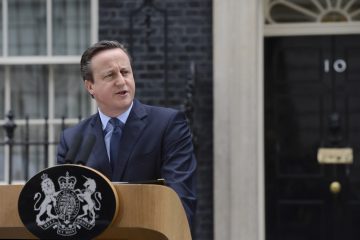
How do we control what we measure using quantitative text analysis methods?
Dr Ben Lauderdale from the Department of Methodology at the London School of Economics and Political Science delivered a special masterclass on Tuesday 24th May 2016. Ben’s research focuses on the measurement of political preferences from survey, voting, network and text with a particular focus on using text data. This event presented the latest developments in ways social scientists can use text and provides an excellent opportunity to explore the promises but also the limitations of this quickly expanding research field. For further information on text analysis in social science see Felix Krawatzek and Andy Eggers Podcast Series.

Brexit referendum folly
The consequences of the Brexit referendum are bad for both Europe and Britain, regardless of the result. The EU referendum in the United Kingdom was intended as a festival of democracy, but it has proved to be an exercise in political madness. Brits pride themselves on being sensible and pragmatic people, but they embarked on a sentimental journey into the unknown. Rational arguments are being set aside while populists are having a party. The prospect of a referendum with an uncertain result has already caused a great deal of disarray, and those who count the costs of a possible Brexit should realise that major damage to Europe and the United Kingdom has already been done. A few million partisan national …

Democracy against the odds
Democracy in Africa: Successes, Failure and the Struggle for Political Reform testifies to the ability of African states to democratize against the odds. It effectively introduces a framework for understanding how leaders choose to respond to the pressure to liberalise their political systems, covering the recent history of African politics and providing great detail on the return of multiparty politics in Africa since the early 1990s. In this Q&A, Ian Cooper of the Department of Politics and International Studies (POLIS) at the University of Cambridge interviews Professor Nic Cheeseman, Associate Professor of African Politics, Jesus College, University of Oxford, on his recent publication.

Brexit: How the New Digital Economy Bill relates to EU regulation
The Queen’s speech announced a new Digital Economy Bill. One of the main measures is to mandate a minimum broadband speed of 24Mbps for at least 95 per cent of UK homes and universal service obligation minimum of 2Mbps. It is proposed that funding for this will come from an industry levy. Any broadband subsidy under the BDUK programme is subject to EU state aid rules particularly if disputed by the private sector (as previously) or could be challenged under WTO countervailing measures in the future if Brexit occurs and the UK does not participate in the Single Market. The bill is also to introduce a new Electronic Communications Code to reduce the ability of landowners to overcharge for laying …

Britain’s Brexit Debate: Leave Albania out of this, please!
I was around ten-years-old when my family found itself in a difficult economic situation. I had to go to work to help earn cash. One day, as I was carrying some heavy items, a father and his son were passing by, both clearly of some means. Glancing at me the father addressed his son with more or less these words: “Listen to what I’m saying. If you don’t study, you’ll end up like him.” I felt awful that the father was using my difficult situation to scare his own son. Besides, it was inaccurate. He assumed that I was poor because I was not in school, which was not the case. I was poor because I was unfortunate and no …

The Labour Case for Vote Leave
‘I will be voting to leave the European Union’. It is a sentence which almost always attracts gasps of horror from my fellow students and dons in Oxford, one of the most pro-EU cities in Britain. But, polls show that at least 40% of the British public, many of whom voted Labour in the last general election, agree with me. My decision to vote ‘Leave’ is based on my belief in democracy, socialism, and a political economy which protects the living standards of the British working class. As a Labour member since I was eighteen, I will be voting to leave the EU not in spite of the principles which led me to the Labour Party but because of them. …

Saving devolution from itself: Building regional democracy in the North of England
Devolution. City Deals. Northern Powerhouse. What does this even mean to the average person on the street? Devolution probably reminds most people of Charles Darwin. If not, then it’s something to do with Scotland. City Deals just sound like business as usual. The Northern Powerhouse may be a funk band. If somehow all these big words are about the future of Northern England’s society and economy, about its transport and education and health system, about power and control vis-à-vis Whitehall bureaucracy and the whims of national government, about jobs and infrastructure and other areas where we are spending and raise tax money, then we should be talking about something else. We should be talking about regional democracy – a mechanism …

How Brexit might affect EU audio-visual media services policy-making
This brief will discuss the current issues affecting UK stakeholders in the cross-border audio-visual services sector. It is written in light of the replies to the public consultation on Directive 2010/13/EU on Audio-visual Media Services (AVMSD), the Commission’s Regulatory Fitness (REFIT) exercise, the public consultation on the EU Satellite and Cable Directive, national consultations and a possible exit of the UK from the EU. The paper also draws on anonymised responses to an online survey run by the author. The paper’s findings are considered in the context of current market trends: the increase in high definition channels, decrease in television watching (e.g. DTT, cable, satellite, IPTV) particularly amongst the younger populations, the move towards on-line and on-demand services and changes in content …









